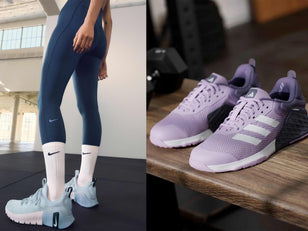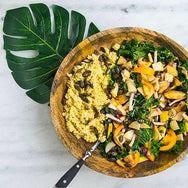
It’s needless to say that 2020 has been a difficult year for all. With a global pandemic still at large, one might think worrying about the size of our bodies would seem silly relative to threatening health concerns. And yet, months later, we’re dealing with the effects of lockdown on our health and our weight. Nearly half of Britons say they’ve gained weight over lockdown. It’s not surprising that people used food to cope during such a stressful time. This, combined with the dismantling of routine and a difficulty remaining active, some amount of weight gain was inevitable. But as regulations continually change, we are able to access some areas of our life which were shut off during the more stringent early lockdown. Gyms have reopened, so what do we do about the weight gain?
WHY WEIGHT GAIN SCARES US
There’s no two ways about it: weight gain is scary. The discomfort and distress goes deeper than just wanting to fit into our favourite pair of jeans. We live in a world that idolises the skinny and condemns the fat. People in larger bodies face more discrimination than any other demographic. Indeed, culture prejudice based on weight is at times more insidious and pervasive than even racism, sexism or homophobia. The fear is, when we gain weight, we aren’t just dealing with a few extra pounds, we move further away from societal expectations and towards social rejection.
With this fear factor it’s not exactly surprising that weight gain feels so uncomfortable and terrifying. We're creatures of conformity who try to meet expectations in order to fit in and be loved. When we gain weight the unconscious fear is that we won’t be acceptable to others and won’t be worthy of love.

So where do we go from this melting pot of self-hatred and fear? The initial compulsion is to do anything we can to lose the weight. The number of posts on how to ‘lose 15 pounds in two weeks’ or ‘get abs in 10 days’ seem to have increased as a knee-jerk reaction to lockdown weight gain. And I get it: the promise of dropping weight and getting your ideal body quickly with minimal effort is tantalising.
The feeling of being out of control of our weight can be unnerving. These quick fixes give us false hope that we can regain some of that control. But I also know from following these programmes for years that they either don’t work or they encourage seriously disordered behaviours. The desire to lose weight as quickly as possible is understandable in the context of our weight-centred culture. However it’s important to think twice before we take drastic measures such as dieting or dramatically changing our work out programme.

HOW TO COPE WITH WEIGHT GAIN
Fluctuating weight is a normal part of being a human. Our bodies were never supposed to stay the same size - they change weight with the seasons, gaining fat to protect us over winter, over the female reproductive cycle, during times of stress, and as we age. The fact that so many people gained weight over lock down shows that it isn’t a personal failing if we gain weight, but a very normal response to stress.
The important thing to consider is that we are navigating the most challenging period of our lifetime, and if we come out a little heavier, so be it. Accepting that bodies sometimes gain weight doesn’t mean we’re enabling obesity or poor health. In fact, it’s quite the opposite. Berating ourselves when the scale goes up is not only unhelpful to our self-worth but counterproductive to weight loss. The more we stigmatise ourselves, or experience stigma from others for our size, the more likely we are to continue weight gain. So even though those abusive thoughts might make us feel that they’re helping to fix the problem, they’re actually making it worse.

Approach weight gain with a healthy mindset
If we are to have a healthy conversation about weight gain, or even our weight goals, there are a couple of techniques to keep in mind which will help achieve long term results and an overall healthier attitude about weight changes.
-
Talk to yourself with compassion. It’s easier said than done. I find a ‘fake it till you make it’ approach is most effective, even if you don’t necessarily believe the things you’re saying to yourself. Self-talk is a self-fulfilling prophecy, so the sooner you start speaking to yourself with more compassion, the more receptive to positive change you’ll be.
-
Make small but maintainable healthy changes. If you’ve been less active than usual, or find yourself eating more during lockdown fret not as you’re certainly not alone. If you feel weight loss is something that will benefit you, the best way to go about it is to play the long game. Make small changes that feel manageable and easy to maintain in the long-term, so they can be incorporated into a healthy lifestyle.
The compulsion to cut out carbs or do a HIIT class every day might be strong but if that isn’t part of your routine already, it’s unlikely that you’ll maintain such behaviour over the long-term. Instead think about smaller, less punishing changes you can make (talk to yourself with compassion, remember?). Where could you include more vegetables or protein in your diet? What could you do to be more active in a way that you enjoy?
By asking these questions we can still move towards healthy goals and get fitter over time without adopting strict rules that are bound to make us feel like we’ve failed when we inevitably break unrealistic expectations. The key thing is not to make the changes feel like a punishment for daring to gain weight, but an act of self-care that will make us feel healthier and happier.

EMBRACE INTUITIVE EATING
For many people, eating habits have changed during this unusual time. Rather than stress over our relationships with food during lockdown, try to embrace the idea of intuitive eating. Intuitive eating encourages radical acceptance when we gain weight. This means loving our body, and treating it well, no matter its size. No, this doesn’t mean we celebrate the weight gain and eat unhealthy foods, it means we continue to talk kindly to ourselves and eat when we’re hungry and exercise in a way that is enjoyable and feels good.
For me loving the way my body looks feels like a stretch, so I try to practice body neutrality - feeling neither here nor there about my body.
PRACTICE POSITIVE SELF-TALK
On my journey to body acceptance, I worked to remove the aspects of my day where I was hating on myself. It was a constant battle not to see my flaws when I looked in the mirror, so I did away with the mirror in my room. I can’t tell you how freeing it was not to agonise over how I looked all day. Now, most days I go for hours without even looking at my body, who knows how much time I’ve saved for more important things!
This is to say, set yourself up for success by removing pitfalls you know may create negative encounters for you. For me it was the simple act of taking a mirror out of my room to liberate myself from my own negative self-talk. What is something you can do to create a more positive environment for yourself?

SHOP FOR CLOTHES THAT FIT YOUR CURRENT SIZE
Something else that helped me is buying clothes that fit. For years, I held onto clothes that fit my thinnest self (who essentially wasn’t eating and was practicing unhealthy behaviour by over exercising) with the hope I would one day have a body that can wear them again. Then I read a quote saying ‘your clothes are meant to fit your body, your body isn’t meant to fit your clothes’ and realised how silly it was that I felt like such a failure for not fitting into my old clothes.
Now I buy clothes in my current size and I feel much more comfortable. Instead of getting upset when I don’t fit into the size I think I should be, I try to accept where I’m at. I’d be lying if I said it didn’t bother me sometimes, but I’d much rather be able to breathe in my clothes than spend all day sucking it and punishing myself for the weight gain. And in any case, wearing clothes that fit will always look better than squeezing into the wrong size! Who knows, maybe one day I’ll fit back into the smaller clothes, or maybe I’ll have to buy the size up again. But either way, I’m free from the shackles of trying to stay at the same weight.

IS THERE A SILVER LINING?
A final tool at your disposal for coping with weight gain is to reflect on the positive things that might have come with it. For me, the extra weight is a sign that my eating disorder no longer controls my life, and my relationship with food is better than it has been in years. Through the lens of the pandemic, perhaps the positive things that come with weight gain are as simple as getting through the challenge of lockdown, or a nurturing new talent for baking.
Again, this doesn’t mean we are glamorising weight gain or encouraging it. Rather we’re not being unnecessarily harsh on ourselves for getting through this mentally taxing time in whatever way we had to.
CONCLUSION
These behavioural changes are also ways to psychologically tell ourselves that we are more than our bodies, that we are worthy and loveable no matter how we look. Nothing good has ever come from self-hatred. The best way to move on is to neutralise those critical thoughts, make small changes towards our goals and remind ourselves that we are so much more than our bodies.





























































